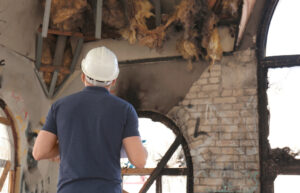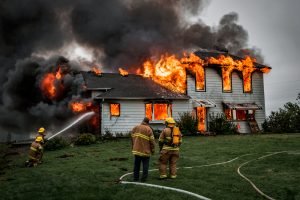A Day in the Life of a Catastrophe Claims Adjuster: Navigating Storms and Restoring Lives
In the insurance industry, the role of a catastrophe claims adjuster is often underestimated and overlooked until a natural disaster strikes, leaving behind a trail of destruction. These dedicated professionals play a pivotal role in helping individuals and communities rebuild in the wake of hurricanes, wildfires, floods, tornadoes and other disasters. A day in the life of a catastrophe claims adjuster can be a high-stakes, emotionally charged journey through chaos and resilience.

Early in the Day
The day often begins early for a catastrophe claims adjuster. Most often, they are stationed in areas prone to natural disasters and are ready to deploy at a moment’s notice. Adjusters must stay informed about weather forecasts and potential disaster threats to be prepared for a sudden deployment. For some this may mean keeping a bag packed of essentials at all times and once the weather event has ended it’s time to get to work.
On the Ground
When a catastrophe strikes, claims adjusters are among the first to respond. They load their vehicles with essential tools, including laptops, cameras and measuring devices. The initial site visit is crucial. Adjusters assess the extent of the damage, speak with policyholders, and provide immediate assistance and reassurance. This part of the job can tug at an adjuster’s emotional heart strings as they will be seeing absolute devastation and coming into contact with policy holders who have absolutely lost everything and possibly some loved ones as well.
Navigating Chaos
A catastrophe claims adjuster’s day can be chaotic, with multiple assignments spread across a disaster-stricken area. They must navigate through debris, flooded streets, and sometimes inaccessible locations. Their goal is to help policyholders start rebuilding their lives by gathering information quickly to expedite the processing of insurance claims.
Interacting with Policyholders
The emotional toll of a natural disaster is immeasurable. A catastrophe claims adjuster often finds themselves in situations where policyholders are dealing with shock, grief, and uncertainty. Their ability to empathize and communicate effectively is just as crucial as their technical skills. Adjusters guide policyholders through the claims process, explain coverage details, and offer hope in a time of despair. They often have to repeat the same information multiple times and document their interactions so policyholders can review the details again later.
Assessment and Documentation
Once on the scene, adjusters meticulously document the damage. They take photographs, measurements, and detailed notes to accurately assess the loss. This information is critical for determining the scope of coverage and expediting the claims settlement process.
Working with other Experts
Catastrophe claims adjusters often collaborate with various experts, including engineers, contractors, and forensic specialists, to assess complex damages. These professionals help in determining the cause and extent of damage, which can impact the coverage provided. As an adjuster working directly with the policy holder it will be your job to explain why the need for additional experts. For example, if a policy holder experiences a tornado and has structural damage to their home, an engineer may be called in to assess if the tornado did in fact cause the structural damage or if the damage was caused from homeowner neglect.
Navigating Insurance Policies
Insurance policies can be complex, and understanding the fine print is essential. Adjusters are well-versed in insurance policy language and work to ensure policyholders receive the fair compensation they are entitled to based on their coverage limits.
Data Management
In today’s digital age, claims adjusters rely on technology to streamline their work. They enter data, photos, and notes into specialized software, which not only facilitates efficient claim processing but also ensures accuracy and compliance with industry standards.
Negotiation and Settlement
Once the assessment is complete, adjusters engage in negotiations with policyholders to reach a fair settlement. This can be a delicate process, as policyholders often have high expectations and are dealing with emotional stress. Adjusters must balance empathy with professionalism to ensure a mutually satisfactory resolution.
Supporting the Community
Catastrophe claims adjusters are not just professionals, they provide support and resources for the communities they serve. They connect policyholders with resources, answer questions, and provide guidance on navigating the challenging aftermath of a disaster.
Adaptability and Resilience
The life of a catastrophe claims adjuster demands adaptability and resilience. They may spend long hours in adverse conditions, often away from their families for extended periods. They must be prepared to work in high-stress environments and make quick, accurate decisions while working with people who are enduring some of the worst days of their lives.
End of the Day
A catastrophe claims adjuster’s day doesn’t end when they leave the catastrophe site. They return to their temporary accommodations, where they continue to process claims, communicate with policyholders, and prepare for the next day’s assignments. This routine repeats until the disaster is under control, and all claims are processed.
A day in the life of a catastrophe claims adjuster with initial ACA training from Educational Services & Consulting is a testament to human resilience and the power of insurance to provide a safety net in times of crisis. As they continue to refine their skills initially learned through ESC’s comprehensive training program, these professionals play a critical role in helping individuals and communities rebuild their lives after devastating natural disasters. Their work is a blend of technical expertise, empathy, and unwavering dedication to making a difference in the lives of those they serve.

For more information on how to earn your 6-20 ACA designation and join this growing field, we invite you to call our Clermont, Florida office at 1-800-309-2459 or read more about the accredited claims adjuster certification process on our website. Beyond our ACA courses, we have partnerships that allow our students to continue learning the proper ways to handle claims and so they can grow in their career.
In Florida, once you earn your 6-20 accredited claims adjuster designation and pass our final exam, you can apply to the state for your all-lines adjuster license. This will enable you to work on home insurance claims, auto and RV insurance claims and property insurance claims. You would have the flexibility to work as a staff claims adjuster or an independent insurance adjuster. Once you earn your ACA designation through ESC, you don’t need to take the state adjuster exam after successfully completing our course and receiving a passing grade on the final exam.
Even if you move out of the state of Florida or your practice takes you out of state, Florida has a reciprocity agreement with other states within the U.S. Individuals who obtain their Florida license are eligible to work in 34 of the 37 states across the U.S. that require an adjuster license. Call us today and let us help you get a jump start on your new career track!
